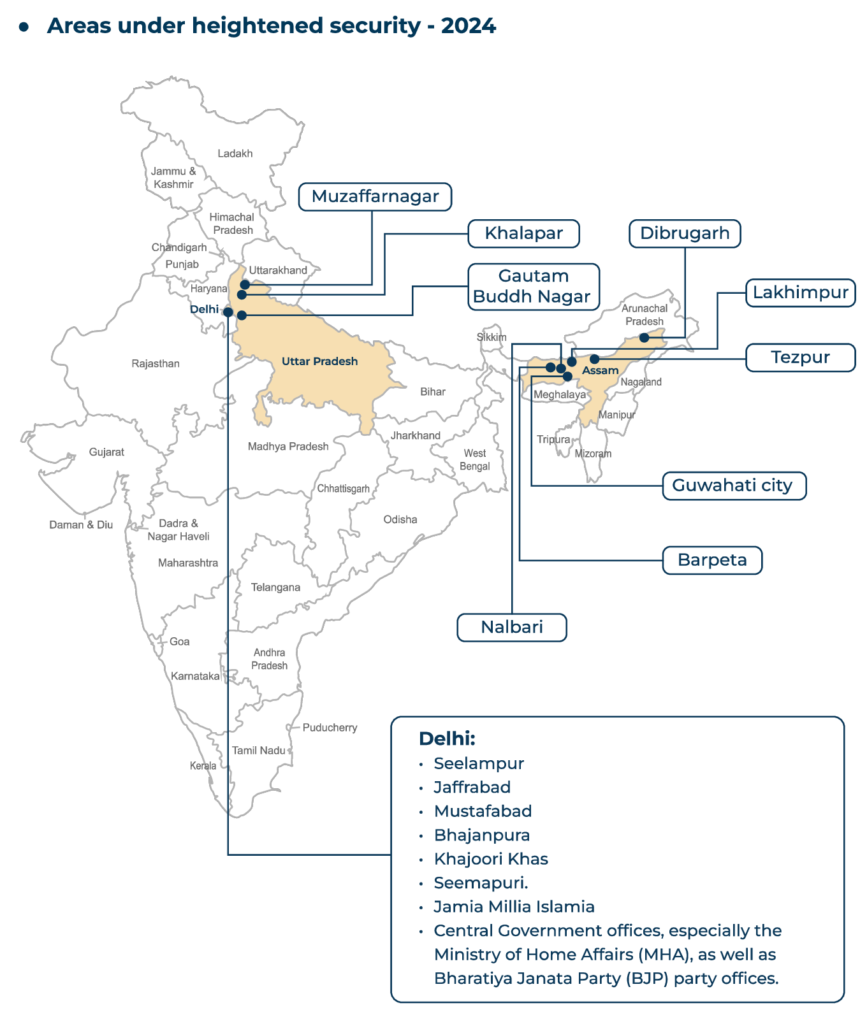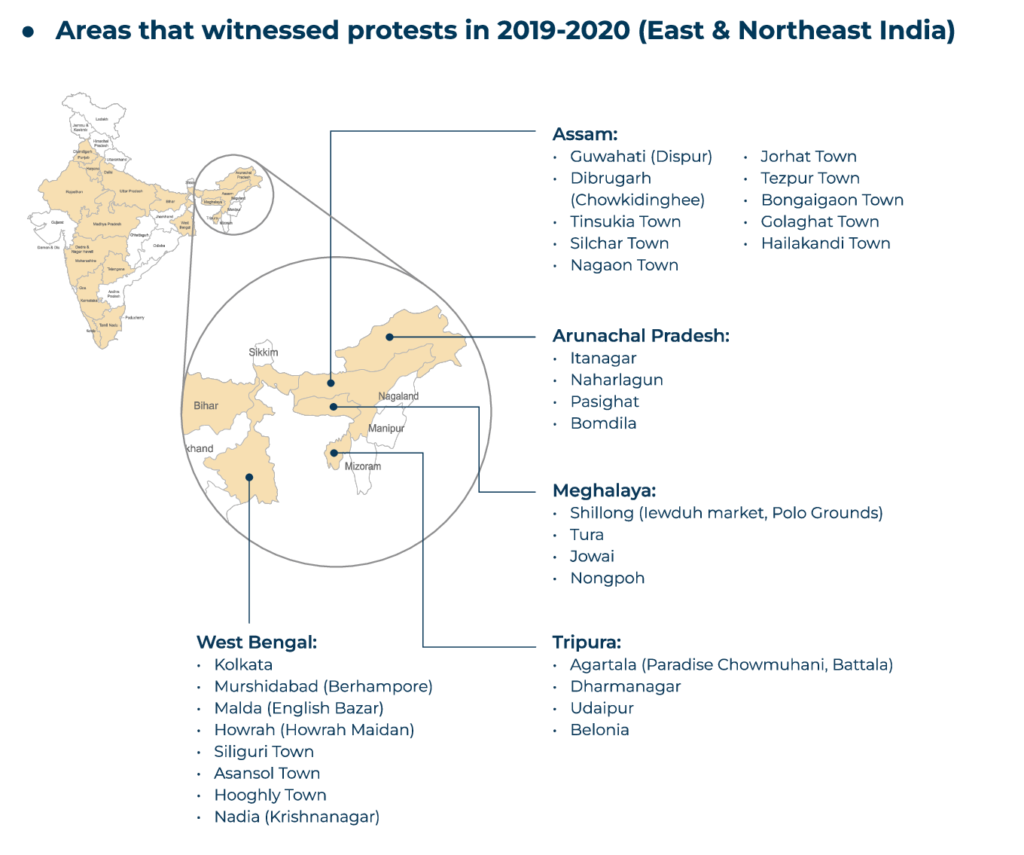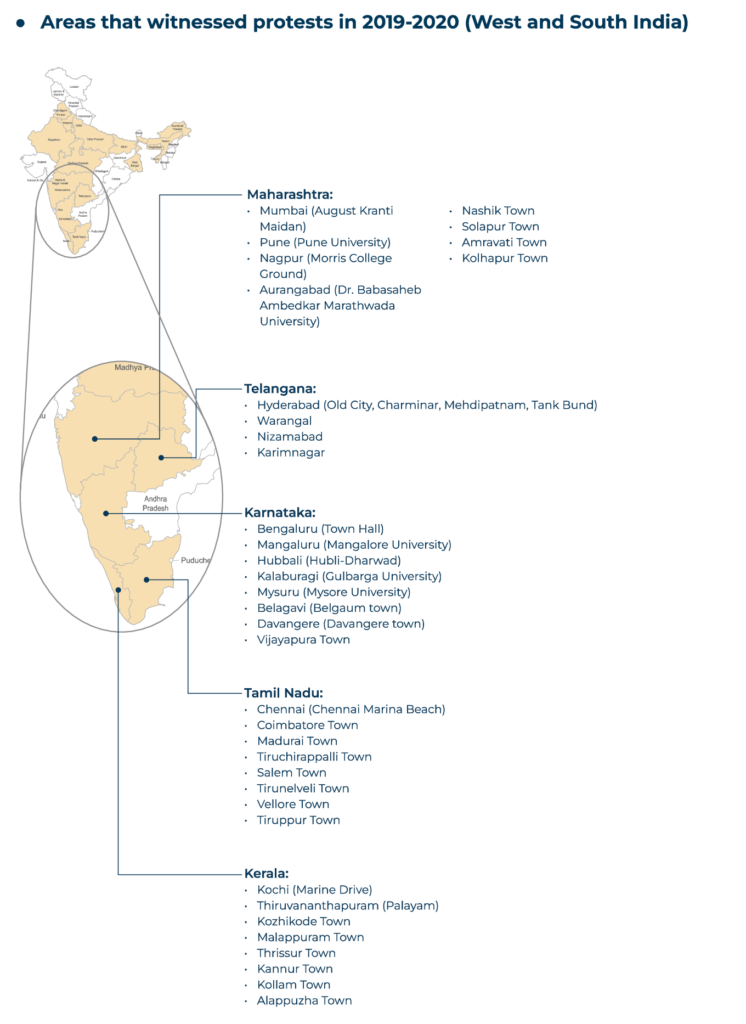The Bharatiya Janata Party (BJP) led Central Government notified the rules of the Citizenship Amendment Act (CAA) on 11 March 2024. Earlier in 2019-2020, the enactment of the Act were heavily protested in different parts of the country.
With the General Elections scheduled this year, similar demonstrations can be expected in 2024 as well. Assam held a statewide strike and protests immediately after the announcement, on 12 March 2024. Demonstrations were also reported in parts of Tamil Nadu and Kerala. Anticipating escalations, security measures have been heightened, with security deployments in sensitive areas, notably Delhi and Assam, where major protests had occurred previously. Pre-election period in India tends to witness heavy political activity and the new development regarding CAA may result in further disruptions. Therefore, it is necessary that businesses remain aware of the imminent risks and ensure timely preparedness.
What is the issue?
The Citizenship Amendment Act (CAA), passed by the Indian government in December 2019, aims to provide expedited citizenship (reduces the qualification period for application of citizenship from 11 to five years) to persecuted minorities from neighbouring countries. The legislation mentions Hindus, Sikhs, Jains, Buddhists, Parsis, and Christians who entered India from Afghanistan, Bangladesh, and Pakistan prior to 31 December 2014. However, the absence of clear mention of Muslims from this legislation has sparked widespread controversy and accusations of being discriminatory. Additionally, there is a growing concern that the government may roll out the proposed National Register of Citizens (NRC), which along with the CAA may affect the citizenship of those Muslims who fail to show proper documents. However, the Home Ministry has assured that the Act does not prevent any Muslim from applying for Indian Citizenship under the existing laws.
Who does the CAA apply to?
- Applies to:
- Hindu, Sikh, Buddhist, Jain, Parsi, and Christian immigrants from Afghanistan, Bangladesh, and Pakistan who entered India before 31 December 2014.
- Muslims from foreign countries will be able to seek Indian citizenship under Section 6 of the Act, which deals with citizenship by naturalisation.
- Does not apply to:
- Indian citizens, regardless of their religion or country of origin.
- Areas covered by the Constitution’s sixth schedule – Assam, Meghalaya, Tripura, and Mizoram.
- Areas covered by the Inner Line Permit system (ILP) such as Arunachal Pradesh, Mizoram, Nagaland, Manipur, Lakshadweep and Himachal Pradesh.
Timeline of CAA:
- 11 December 2019
Citizenship Amendment Bill (CAB) passed in Parliament.
- 12 December 2019
Citizenship (Amendment) Bill, 2019 becomes an Act following President Ram Nath Kovind’s assent.
- 15 December 2019
Protests started escalating through Aligarh Muslim University (AMU), Delhi’s Jamia Millia Islamia University (JMI); and Shaheen Bagh in Delhi.
- 27 December 2019
Left parties announced a seven-day nationwide protest from 01-07 January and a general strike on 08 January against CAA.
- December 2019-January 2020
Pleas challenging CAA filed in Supreme Court.
- 30 January 2020
A student from Jamia Millia Islamia was injured in a shooting incident.
- 23 February 2020
Communal violence broke out in northeast Delhi.
- 24 March 2020
Delhi Police evacuated protesters from Shaheen Bagh in view of nationwide COVID-19 lockdown announced by Prime Minister Narendra Modi.
- 27 December 2023
Union Home Minister Amit Shah reiterated the government’s commitment to implementing CAA.
- 28 February 2024
Reports emerged that the Centre will notify CAA rules ahead of Lok Sabha polls, due in April-May.
- 11 March 2024
CAA rules notified.
- 12 March 2024
Sporadic protests reported from parts of India.
Areas of Impact:

Areas of Impact:


Areas of Impact:

Areas of Impact:

Impact on Businesses:
Immediate impacts –
- In Assam, the Congress-led United Opposition Forum (UOF) and approximately 30 student and indigenous groups, including the All Assam Students Union (AASU), vowed to escalate protests against the Citizenship Amendment Act (CAA). In West Bengal, Chief Minister Mamata Banerjee and leader of Trinamool Congress (TMC) announced protests against the CAA. The possibility of similar protests by political parties and student groups in other parts of the country remains possible, thereby impacting employee commute and supply chains.
- Due to the threat of protests, there remains a possibility of disruptions in essential transport services such as railways, airports, and inter-city buses, similar to the major disruptions witnessed in Delhi metro services during 2019 protests.
- Increased security presence can be anticipated in the business districts of the NCR including areas like Connaught Place, Gurgaon, Noida, Cyber City, Saket, Nehru Place, Okhla Industrial Area, Bhikaji Cama Place, DLF Cyberhub, and Rajendra Place.
- Protests may lead to temporary closures of shops, malls, and commercial establishments as were witnessed in Assam during the strike on 12 March 2024.
- Student protests may come into prominence. Student rallies and demonstrations near the vicinity of Central and State-led Universities remain likely which may impact local traffic. Earlier, student-led protests were reported in Delhi’s Jawaharlal University and Jamia Milia Islamia University, Banaras Hindu University in Varanasi, the Tata Institute of Social Sciences, IIT Bombay, IIT Madras, Indian Institute of Science Bangalore, Jadavpur University in Kolkata, Aligarh Muslim University, Lucknow’s Integral University and Nadwa College.
In case of escalations –
- The possibility of communal clashes and subsequent unrest remain likely particularly in sensitive areas like Northeast Delhi, Guwahati, Muzaffarnagar, Aligarh Meerut, Kanpur, Lucknow, Varanasi, Malda, Cooch Behar amongst others.
- Possibility of a Bharat Bandh (Nationwide shutdown) as was witnessed on 08 January 2020 cannot be ruled out. In the earlier instance, offices had to cease operation or operate at limited capacity. Severe transport disruptions remain likely.
- In areas with escalated tensions, businesses may face risks of damage to physical infrastructure and assets due to vandalism, arson, or other forms of violence, leading to financial losses.
- During the 2019 protests, traffic disruptions occurred at Shaheen Bagh and Jamia Millia Islamia University – the protest epicentres in Delhi. This led to restrictions on the Kalindi Kunj-Shaheen Bagh stretch, resulting in significant bottlenecks around the Delhi-Noida Direct Flyway. Similar disruptions are anticipated in Delhi.
- Heightened security measures and roadblocks could impact the movement of goods and personnel, affecting supply chain and distribution networks.
- Authorities may impose curfews and restrictions like Section 144 to maintain law and order, limiting movement, gatherings, and activities in protest-affected areas.
- Authorities may also issue advisories suggesting work-from-home options to minimise public exposure to potential risks during periods of unrest.
- Businesses operating in proximity to protest sites may experience disruptions in operations, employee safety concerns, and difficulties in accessing facilities, impacting daily functions.
- The possibility of suspension of the internet as needed to address the spread of fake news, rumours, and protests, which could affect online services.
Recommendations:
Organisations:
Immediate preparedness –
- Considering plausible protests and the extensive security arrangements in place, disruptions in travel and supply chain operations cannot be ruled out. Advised to plan for delays.
- Establish clear communication channels to keep employees informed about the current situation, potential risks, and any organisational updates or changes in operations.
- It is also advised to provide transportation facilities to all (especially, women employees) if operating in areas witnessing protests.
- It is also advised to run a security check of all physical facilities, flammable items, CCTVs, electronic appliances, and conduct fire safety audits.
- Unscheduled power outages are a possibility, advised to have adequate power backups ready.
- The threat of cybersecurity risks runs high during periods of unrest, therefore, run a thorough check of all systems and update all software.
- Encourage employees to take the time to verify the authenticity of calls, emails, and text messages before communicating sensitive information.
In case of escalations –
- Temporary internet suspension is a possibility, advised to remain prepared for such contingencies.
- Ensure all doors and windows are secured at the end of each business day in order to minimise the impact of any sudden outbreak of violence or act of vandalism.
- Develop contingency plans for emergency situations, including evacuation procedures and protocols for handling security threats.
- Enhance physical security measures, such as installing additional security cameras, increasing security patrols, and implementing access control measures.
- Blockades of highways by protestors cannot be ruled out, advised to plan for supply chains accordingly.
Individuals:
- Cater for likelihood of traffic disruption in the vicinity of the protest locations. Advised to keep additional time in hand and keep alternate routes mapped.
- Advised to avoid making sensitive comments both in public discussion and social media as it may act as a trigger to the ongoing disturbances.
- Steer clear of protest sites and remain vigilant of situational updates.
- Maintain situational awareness and be mindful of surroundings, especially in areas prone to protests.
- Advised to not panic and rely on official/ verified information as there could be a surge in potential increase in circulation of WhatsApp forwards or fake news.
- Follow guidance from local authorities and adhere to any curfews or restrictions imposed in protest-affected areas.
Dos and Don’ts during active/potential mass protests
| Do’s | Don’ts |
| Be careful in case visiting to or near any Central/State-run University as student protests are highly likely. | Do not criticise anyone publicly for participating or not participating in the protests. |
| Do not criticise anyone publicly for participating or not participating in the protests. | Refrain from commenting on anyone based on their culture or religion. |
| Refer to reliable sources only for credible information. | Avoid drawing opinions from sensational news. |
| Keep the windows of cars closed. In case travelling with minors, keep the child lock on. | Outbreak of clashes or vandalism remains a possibility during stressing time. Driving/travelling with car windows open can be dangerous. |
| Take additional precautions at work and home to avoid any unnecessary or collateral damage. | Do not keep large sums of money or jewelleries at home. |
| While travelling or visiting office, keep emergency numbers on speed dial and check the traffic situation on Google Maps before commencing travel. | Do not drive/travel through areas that are marked Red in Google Maps. It is possible that those routes are witnessing rallies. |

Emergency Contacts:
- Police- 100
- Fire- 101
- Ambulance- 108
- Emergency- 112
- Tourist Helpline – 1363
- Women Helpline – 1091
- Senior Citizen Helpline – 14567
- Delhi Police – Delhi City Police; Delhi Traffic Police – +91-11-25844444, 1095
- Gurugram Police – Gurugram City Police; Gurugram Traffic Police– 0124-2386000, 1095;
- Noida Police – Noida Traffic Police 099710 09001
- Assam Police- +91-3612464557/8; Statewide police stations
- Kolkata Police – Kolkata City Police, Kolkata Traffic Police
- Chennai Police – Chennai City Police, Greater Chennai Traffic Police




